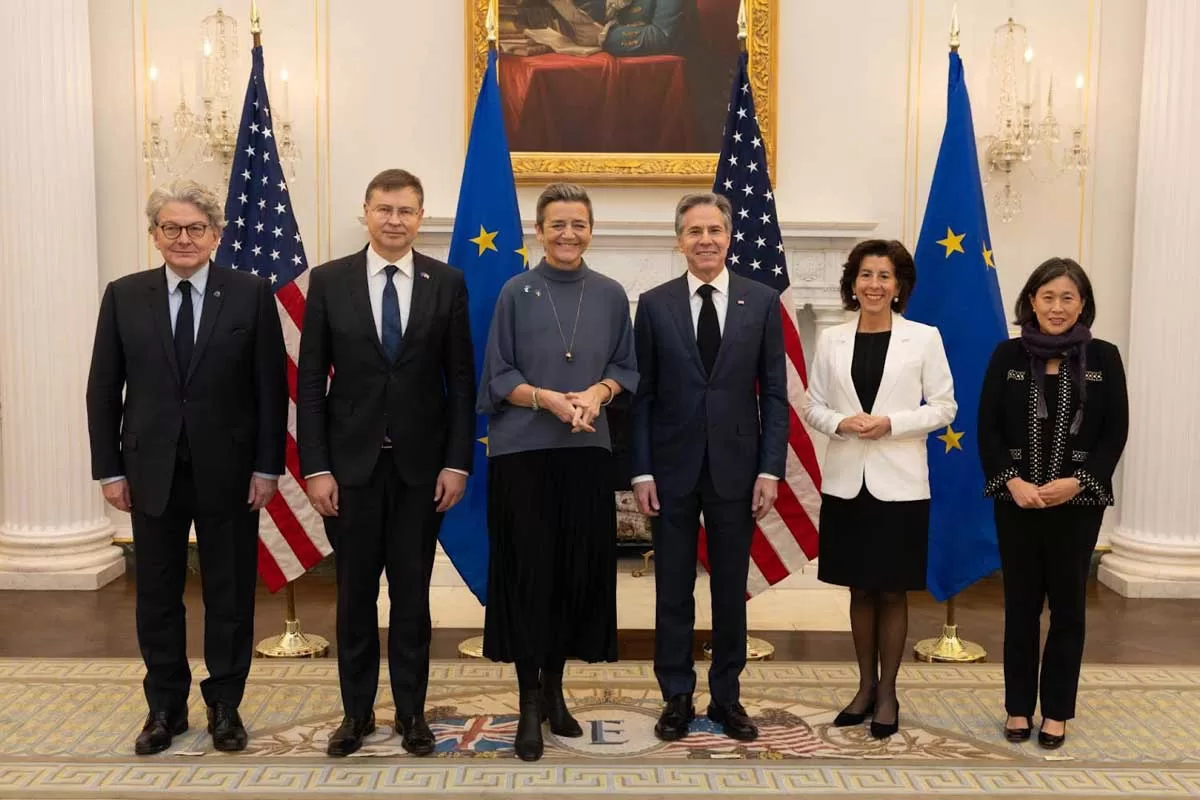Both parties underscored the need to fortify economic security and reduce dependence on critical technologies from authoritarian nations, fostering resilience against disruptions.
Discussions focused on safeguarding technology from being misused for foreign information manipulation and interference, particularly in the context of elections, disinformation campaigns, and attacks on human rights defenders.
The U.S. and EU explored avenues for collaboration in developing artificial intelligence (AI), cybersecurity, and other critical technologies to ensure shared advancement and progress.
Strategies for enhancing supply chain resilience were examined, including diversifying sources of supply and investing in domestic production to mitigate disruptions.
Both parties addressed approaches to encouraging investment in semiconductor manufacturing and strengthening the semiconductor supply chain, acknowledging its significance.
The signing of the U.S.-EU Joint CyberSafe Products Action Plan was lauded, aiming to establish a secure transatlantic marketplace for Internet-connected products.
Co-chairs agreed to reconvene for the sixth TTC ministerial meeting in Belgium during the spring of 2024 to assess progress and identify new areas for collaboration.
Overall, the meeting demonstrated a productive exchange of ideas and commitments, highlighting the ongoing collaboration between the U.S. and EU in addressing trade and technology challenges. The signed action plan for cybersecurity and the planned follow-up meeting in 2024 signal a positive trajectory for transatlantic cooperation in these critical areas.
The question arises: what will the TTC evolve into in the next year or the next five years? Personally, I believe there is no turning back, and the TTC should endure as a forum. The technological landscape has undergone significant transformations, accompanied by substantial policy and regulatory developments. The TTC is well-positioned to address critical challenges at the intersection of trade and technology.
The rapid pace of technological change, the emergence of new digital competitors, and the increasingly complex regulatory environment necessitate a collaborative approach to uphold open trade, promote innovation, and safeguard security. In this era of digital rivalry, unity is crucial. We cannot simply revert to the pre-TTC era under the Trump presidency; such a move is neither feasible nor desirable. Instead, we must move forward and prepare for the rapidly approaching future, considering China’s rise in technological spheres and profound changes in the international system.
On the geopolitical front, the Trump administration’s withdrawal from the Trans-Pacific Partnership (TPP) and its inaction on trade liberalization have potentially provided China with an opportunity to establish leadership in setting rules and standards for trade and the economy, particularly in emerging technologies like artificial intelligence and digital trade.
I firmly believe that the TTC can become an indispensable forum. Whether a new administration is willing to maintain or strengthen the TTC remains to be seen. However, building consensus among its members on the TTC’s goals and objectives is paramount. This will ensure that the TTC remains a valuable asset for all member states, regardless of their domestic political situations.
I have always advocated for the establishment of a permanent secretariat for the TTC. The Council should be seen as a global forum for addressing trade and technology issues and advancing multilateral interests. Establishing a permanent secretariat would provide continuity and expertise. Additionally, developing a strong public narrative about the TTC’s benefits is crucial for businesses, consumers, and policymakers.
The TTC should actively promote transatlantic values and interests by working towards developing new rules and standards for trade and technology and fostering cooperation on issues like climate change and cybersecurity. Transparency and accountability are essential; making the TTC more transparent and accountable will build trust in the council and enhance its effectiveness in addressing trade and technology challenges.
Regularly evaluating the TTC’s work is essential to identify areas for improvement and ensure its continued relevance and effectiveness. This evaluation process should be transparent and involve stakeholders from all member states. Evaluating the TTC’s work can contribute to building a more solid institution capable of withstanding the challenges of political change.
The TTC has the potential to play a vital role in shaping the future of trade and technology, and the EU should be committed to making it a success. And what does the TTC mean for Europeans? In any case, it does not imply a reduced level of autonomy. In the current context of an ambitious Europe, the era of free riding is definitively over. Europeans must be more autonomous, exercising better control over their own destiny while collaborating with like-minded countries and formulating their own strategies and vision of the world within an international system based on cooperation and multilateralism.
While the future of the TTC remains uncertain, there is a strong case for its continued existence and even strengthening. The TTC can become a valuable asset in addressing the challenges.
